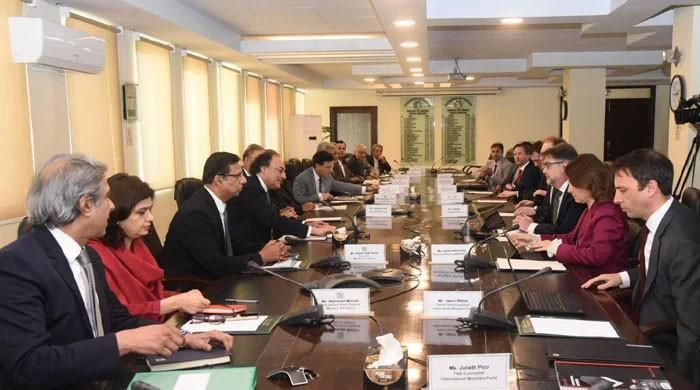- The IMF wants the government to ensure the primary surplus planned for this year.
- The Washington-based lender wants FBR to collect taxes in Punjab.
- Punjab government signs MoU to reduce its spending on 115 billion rupees.
ISLAMABAD: Differences have emerged between the International Monetary Fund (IMF) and Pakistani negotiators over fiscal figures as the Prime Minister Shehbaz Sharif-led government so far resists taking additional tax measures through the mini budget for the period remainder of the current fiscal year. .
The budget deficit target could be revised downwards, but the IMF has been calling on Pakistani authorities to ensure the achievement of the planned primary surplus for the current fiscal year.
The IMF has been very harsh on Punjab's fiscal position due to its inability to generate desired revenues and limit unbridled spending.
During the discussion, it was also put on the table that the Federal Board of Revenue (FBR) should be given powers to collect taxes in Punjab and then transfer them to the country's most populous province after deducting its collection expenses.
The IMF wants to improve fiscal federalism and proposed a review of the NFC Award with the consent of the Center and the provinces in the medium term.
For now, the IMF wants full implementation through better coordination with provinces, including through updated Memorandums of Understanding (MoUs) with the federal government that could help ensure its FY24 budget targets.
The Punjab government had, through its MoU, committed to reduce its expenditure by Rs 115 billion during the remaining period of the current fiscal year to achieve the committed surplus associated with the FY24 budget. The provincial governments have agreed to rectify the decade-long accumulation of commodity debt (created by provincial food departments outside the government's fiscal perimeter) by implementing time-bound plans for the timely retirement of this debt.
However, the IMF demanded that a simplified tax system for retailers be unveiled, but Finance Minister Muhammad Aurangzeb had to rush to another important meeting at the last minute. He could not participate in the IMF meeting on the fiscal front held here on Friday. He would therefore have to share the government's intentions on the proposed plan for retailers, for which the government had already obtained powers in the tax law in the last budget for 2024. This plan does not require any legislative approval from Parliament, but of the Pakistan Muslim League. The Nawaz-led regime (PML-N) seems reluctant to impose taxes on its political constituency belonging to traders.
The IMF showed different projections for the last four months (March to June) which, it stated, were shared by the Ministry of Finance. However, the FBR explained that they would achieve the annual tax collection target of Rs 9,415 billion, so no mini-budget was necessary.
After a hectic debate, the IMF asked the FBR to share its monthly target on time and if the need arises, it will recommend additional tax measures. The IMF obliged the FBR to share the April collection with the Fund until May 3, 2024.
The IMF reminded the FBR top brass that the revenue collector should make plans to launch a door-to-door campaign scheme in four provincial capitals and Islamabad, to register non-filing retailers and expedite their tax filing. .
By cross-referencing tax returns with electricity meter data, the FBR aims to detect evasion and conduct audits where necessary.
The FBR plans to implement safeguards in the form of strict supervision through random audits of assessments submitted under the scheme to verify the accuracy of assessments and payments. The FBR intends to launch this scheme with utmost discretion for field offices to modify assessments and assessments to protect potential income earned from these actions.
To avoid double taxation, monthly advance tax payments under the plan will offset final year-end income tax liabilities at the time of filing, but no refunds will be issued for such advance tax payments. Furthermore, the FBR committed to the IMF to provide timely monthly data on agreed performance indicators.
Regarding the non-tax revenue (NTR) target, there was a discrepancy in the projections made by the IMF and the Finance Ministry as there was a huge gap in this regard. The IMF also referred to overspending witnessing increasing trends, including rising debt service bill, due to which the agreed budget deficit target for the federal government could be revised upwards, approaching 7.9 % of GDP.
Originally published in The News












